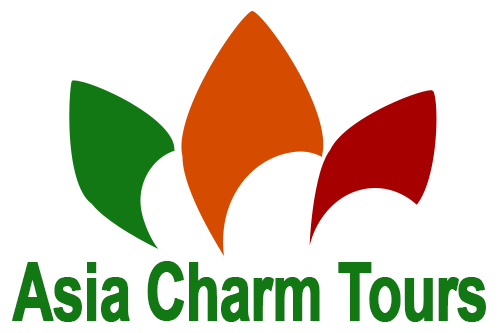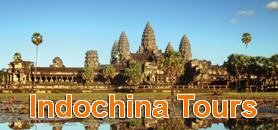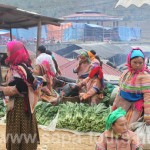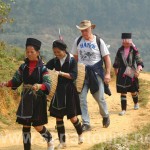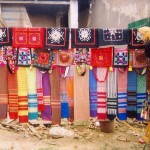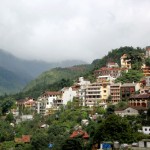The custom of marriage in Sapa Vietnam – H’Mong Ethnic Group ( Part 2)
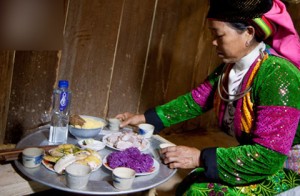 During the wedding, there are many rules a bride must follow. Here are some examples and facts:
During the wedding, there are many rules a bride must follow. Here are some examples and facts:
When leaving the bride’s house, during that process, the bride must never look back for it will make her miss her family dearly.
During the feast, no pepper dish can be served for it’ll make the bride and groom’s marriage life bitter.
At some point during the wedding, an elder would come ask the bride if she has any old gift(s) from past boyfriend(s). If she does, she must give them those gifts and they will return the gifts to her past boyfriend(s).
There is a saying that if a bride does not give her past boyfriends’ gifts back, if he still really loves her and dies early, he’ll come haunt her babies, which will make her babies cry a lot.
The brides maid’s job is to make sure the bride doesn’t run off with a guy because way back in history, many girls were forced to marry and would elope with their boyfriends.
Because the price of a bride is so high(depends on the parents), the groom’s clan helps pitch in to help with the exchange of his wife. Afterwards, both the bride and groom must pay them back. However, according to different clans, they can do payments too.
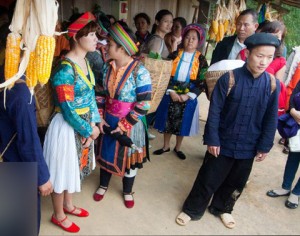
In the 21st century, Hmong people who practice Christianity may follow traditional Hmong weddings; however, some ritual such as “lwm qaib” and “hu plig” are no longer practiced. Some of them follow both traditional Hmong weddings and westernized weddings.
When a husband dies, it is his clan’s responsibility to look after the widow and children. The widow is permitted to remarry, in which case she would have two choices: she may marry one of her husband’s younger brothers/ younger cousins (never to the older brothers) or she can marry anyone from the outside clan (besides her own).
If she chooses to marry an extended member from her deceased, husband’s clan, her children will continue to be a part of that clan.
If she chooses to remarry outside of her deceased husband’s clan, her children are not required to stay with the clan unless a member of the clan (usually the deceased husband’s brother or a male cousin of the same last name) is willing to take care of the children. (This is mostly the practice today in many Western Nations).
If no one from the deceased husband’s clan is willing to raise the children, they will follow their mother into her second marriage. Once the children go with their mother to be a part of their stepfather’s family, a spiritual ceremony may take place.
The children can choose to belong to their stepfather’s clan (by accepting his surname, his family spirits, and relatives)or they can choose to remain with their original clan (the family, spirits, and relatives of their deceased father.) Most of the time whether the mother or children like it or not, the clan would keep the son(s).
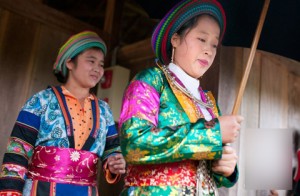
Polygamy is not generally considered the ideal form of marriage among the Hmong, although it has been documented. However, it is increasingly rare among those Hmong who have migrated to Western nations.
Divorce was rare in traditional Hmong society, however it is becoming more prevalent in westernized Hmong communities. If a husband and wife decide to divorce, the couple’s clans will permit a divorce but will evaluate the situation fairly.
If just the wife wants to divorce her husband without any firm grounds, the bride price must be returned to the husband’s family, as the wife will be the one choosing to leave the household.
If just the husband wants to divorce his wife without any firm grounds, the husband will have to come up with some money to send the wife back to her family with all the children, as the husband will be the one choosing to leave the household.
By tradition, the man and the woman have equal custody of all the children. If it is determined the wife had committed adultery, the husband will get custody of all the children; with the dowry and an additional fine.
However, if it is determined the husband had committed adultery or married a second wife and the wife cannot continue being part of the family, she will have the option to leaving her husband without paying back the dowry. Also, if the husband allows, she can take her children with her. If a divorced man dies, custody of any male children passes to his clan group.
Also see:
- Sin Chai village
- Tram Ton Pass
- Ta Van Village – A pure gem of Sapa
- The Nung and Tu Si house with tranditional baked clay roof tiles
- Beauty of mist in Ham Rong Mount
- Church singing in early spring in Ta Phin
- Sour noodle soup – Upland unique cuisine in Sapa
- Story about unique horse-drawn carriage in Bac Ha
- Bird Market in Muong Khuong village
- Plum flowers blossom in Bac Ha during February.
- Sapa Pau Play Day Cake
- Salmon in Sapa


